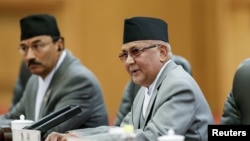Nepal's prime minister resigned Sunday, plunging the south Asian country into another period of political and economic uncertainty.
Prime Minister K.P. Oli resigned just minutes before parliament was to vote on a no-confidence proposal he probably would have lost.
Oli's departure marks the 23rd time the Nepali government has fallen since a multi-party democracy was created in 1990.
The no-confidence motion was made by former Maoists rebels who stopped supporting Oli after accusing him of reneging on a power-sharing agreement.
Oli's former allies also accused him of not addressing political concerns of Nepal's ethnic Madhesi minority, which complained the creation of new federal states marginalized them by splitting their homeland.
Not addressing this concern and failing to rebuild many homes destroyed in earthquakes last year as promised "made us unable to continue to work with him," Maoist chief Prachanda told parliament Friday.
Prachanda is the favorite to replace Oli, who will continue his duties as prime minister until parliament selects a replacement, a process that could take several days.
President Vidhya Devi Bhandari is expected to give political parties one week to select a candidate for prime minister. If a candidate is not chosen, legislators will try to elect a new prime minister with a vote on the house floor.
Two of Nepal's neighboring countries, China and India, are wrestling for influence over the young republic out of concern that political turmoil could turn one of the world's most impoverished nations into a refuge for criminals and militants.





